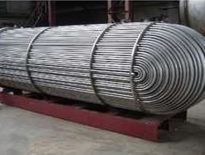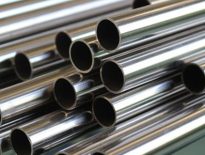Stainless Steel alloys are considered to be the most versatile metal alloys with numerous benefits for the users and manufacturers. Stainless Steel has evolved as an inseparable and essential part of various industries. Stainless Steel is comprised of “steel alloy” with added amounts of chromium. This chromium addition is what gives stainless steel components an extra edge. Chromium content present in the alloy reacts with oxygen to form a passivation layer. This chromium oxide passivation layer acts as a barrier protecting the alloy from corroding.
Some of the major perks of stainless steel alloys include:
- Rust and Abrasion resistance
- Anti-Corrosive
- Oxidation Resistant
- Variety of Grades
- Endless Recyclability
- Cost-Efficiency
These benefits make stainless steel the most used alloying material across nations and industries. One of the mainly used pieces of equipment forged out of stainless steel is “Stainless steel pipes”
What are stainless steel pipes? What are its types?
Stainless steel pipes are simply hollowed-out rods. Stainless steel pipes have multiple applications in a wide array of industries ranging from households to complex types of machinery. For simple household applications, the 200 Series of SS grades are a perfect fit. Whereas for complex types of machinery and pieces of equipment in corrosion-prone environments, ferritic and austenitic grades such as 304, 321, 316, 316L, and Duplex grades are appropriate. However, in general, grade 304 L stands out as the most versatile grade for both simple and complex applications.
What are the uses of Stainless Steel pipes?
- Corrosion Resistivity:
Over the years, stainless steel has proven to be the best alloy for use in terms of rust, abrasion, and corrosion resistance. Some SS pipes require annealing after the welding process to retain maximum strength and corrosion resistance. Duplex grades and grade 316 can withstand severely corrosive environments including chloride corrosion, pitting, and crevice corrosion.
- Pressure pipes:
For high-pressure applications, stainless steel grades with a sturdy and strong exterior are a requisite. Generally, a nickel-chromium SS alloy fits the description well. Ferritic grades of stainless steel have high-pressure ratings suitable for high-pressure applications.
- Aircraft tubing:
Components used in aircraft need to be extremely sturdy and reliable since they are continually exposed to extreme atmospheres and pressure conditions. Stainless steel tubes fit into the role appropriately. Additionally, Stainless steel tubes also provide superior corrosion resistance and heat resistance.
- Sanitary tubing:
When it comes to applications in the food industry, the pipes used need to be free from germs and microbes that can cause foul situations. Thus, stainless steel alloys are the primary tubing choice. A similar situation occurs in the health and pharmaceutical sector where stainless steel pipes are the primary choice of equipment.


